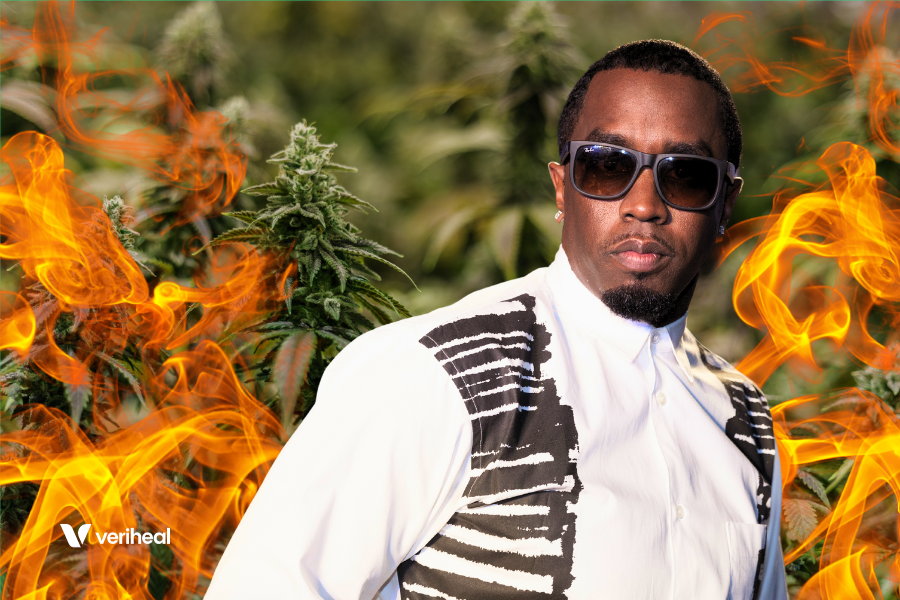Rap mogul Diddy hoped to make waves in the cannabis industry with a massive $185 million purchase, a deal that could have redefined his portfolio and diversified the fast-growing cannabis market. This plan hinged on the successful merger of two multi-state cannabis giants, Cresco Labs and Columbia Care, who had their eyes set on becoming the biggest cannabis operation in the United States.
However, as the merger went up in smoke due to regulatory and economic concerns, so did Diddy’s dream of building a cannabis empire.
In this article, we’ll delve into the complex web of business deals, aspirations, and setbacks that led to the dissolution of what could have been a landmark moment in the cannabis industry.
Diddy’s Cannabis Company Dream
While the failed merger was a blow to Cresco Labs and Columbia Care, it was Diddy, in particular, who saw his cannabis aspirations go up in smoke. This wasn’t merely about adding another notch to his already expansive business belt. It was about fostering diversity and equity within an industry that sorely needs it. Diddy’s blueprint involved acquiring two store locations in Illinois, three in Massachusetts, and four in New York State, along with production facilities in each state.
This geographic spread was strategic, not only to tap into markets with newly legalized recreational marijuana but also to set a precedent for Black ownership on a grand scale. Diddy saw this as an opportunity to break down barriers and pave the way for Black entrepreneurs to have a meaningful stake in the cannabis boom. But with the collapse of the Cresco Labs and Columbia Care merger, these well-laid plans now remain in limbo.
Diddy’s Other Business Ventures and Controversies
While the failed cannabis venture is a significant setback, it’s far from the first obstacle Diddy has faced in the business world. Notably, a few years ago, Diddy had expressed interest in purchasing the Carolina Panthers NFL team, which ultimately proved unsuccessful.
At the time, he had said, “I will immediately address the Colin Kaepernick situation and put him in the running for next year’s starting quarterback.” Despite his enthusiasm and vision for the team, Diddy did not secure ownership, adding to a growing list of business deals that haven’t gone as planned.
Why You Should Get Your Medical Marijuana Card
Veriheal has satisfied millions of patients nationwide by giving them access to these benefits
- Larger purchase limits
- Peace of mind
- Enhanced legal protection
- Access to higher potency strains
- Save up to 25% on cannabis purchases
- Skip the line at the dispensary
More recently, the rap mogul made headlines with a lawsuit against the beverage giant Diageo, accusing them of neglecting his Ciroc vodka and DeLeon tequila brands. But this was more than just a case of broken business promises. Diddy’s lawsuit claimed that racial factors played a part in the company’s decisions.
According to court filings, Diageo allegedly limited distribution to ‘urban’ neighborhoods and treated his brands as inferior, based largely on racial bias. These controversies add another layer to the complexities Diddy has faced as a wealthy Black entrepreneur trying to navigate industries with a history of institutional inequality.
The Impact of Federal Legislation on Cannabis Businesses
Beyond the intricacies of failed mergers and ambitious plans, it’s essential to acknowledge the overarching obstacle faced by all players in the cannabis industry: federal legislation. Despite state-level legalization in places like New York, Massachusetts, and Illinois, the federal government continues to classify marijuana as a Schedule I substance.
This designation not only prevents research into cannabis’ potential benefits but also casts a cloud of legal uncertainty over the entire industry. As a result, the growth of the cannabis market has been notably sluggish, struggling to reach its full potential even in states where it is legal. For someone like Diddy, this legislative framework adds another layer of complexity and risk to an already complicated endeavor.
The Path Forward for Diddy
Despite these setbacks, Diddy and his team remain undeterred in their quest to significantly impact the cannabis industry. According to statements given to the media, the Combs Global empire is “still determined to ‘diversify’ the industry” with its own cannabis operation. It’s clear that the rap mogul sees this not as an end but as a temporary roadblock on the path to achieving his goal of a more inclusive cannabis market.
While the specifics of his next steps remain undisclosed, the resilience and ambition that have characterized Diddy’s career suggest that we haven’t seen the last of his ventures into the cannabis industry.
A Final Note
The collapse of the much-anticipated $2 billion merger between Cresco Labs and Columbia Care had ripple effects that reached far beyond the two companies, notably impacting Diddy’s ambitious foray into the cannabis industry. This episode serves as a stark reminder of the complexities and hurdles that await new entrepreneurs in this space, magnified further for minority business owners aiming to break those barriers.
While state-level legalization has opened doors, federal legislation and regulatory hurdles pose significant challenges. Diddy’s experience, both in this venture and his past failed business pursuits, highlights the complex interplay of economic, regulatory, and racial factors that can influence the success or failure of business endeavors, especially in industries as dynamic and rapidly evolving as cannabis.
Author, Share & Comments
















